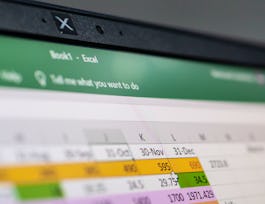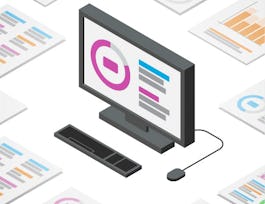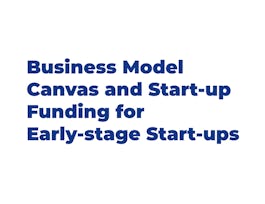Students are introduced to the field of financial accounting through defining the foundational activities, tools, and users of financial accounting. Students learn to use the accounting equation and are introduced to the four major financial statements. Additional topics include ethical considerations, recording business transactions, and the application of credit/debit rules.


What is Financial Accounting?
This course is part of Introduction to Financial Accounting: The Accounting Cycle Specialization
Taught in English
Some content may not be translated

Instructor: Andrea Eliassen
15,692 already enrolled
Included with 
Course
(415 reviews)
96%
Skills you'll gain
Details to know

Add to your LinkedIn profile
8 quizzes
Course
(415 reviews)
96%
See how employees at top companies are mastering in-demand skills

Build your subject-matter expertise
- Learn new concepts from industry experts
- Gain a foundational understanding of a subject or tool
- Develop job-relevant skills with hands-on projects
- Earn a shareable career certificate


Earn a career certificate
Add this credential to your LinkedIn profile, resume, or CV
Share it on social media and in your performance review

There are 4 modules in this course
Welcome to the first module of the course! We will start our introduction to the field of financial accounting by discussing practical applications of accounting information. Additionally we will identify who uses accounting information, address ethical considerations relevant to accounting, and define the three main forms of business ownership.
What's included
2 videos2 readings2 quizzes
In this module we are introduced to the accounting equation and the four basic financial statements. We will start by breaking down the components of the accounting equation: assets, liabilities, and equity. We will then take a look at three out of the four basic financial statements: the income statement, the retained earnings statement, and the balance sheet. In this module's activity we will introduce you to the sum function in Excel, which will be used in the remaining activities for this course.
What's included
2 videos1 reading2 quizzes
In this module we introduce the first step in the accounting cycle: “Analyze Transactions”. By the end of this module you will be able to analyze and record service business transactions within the fundamental accounting equation. First, we will walk through examples of recording business transitions in the video lesson. Then you will complete an activity to practice recording transactions on your own.
What's included
3 videos2 readings2 quizzes
In this module we will analyze and record service business transactions using the debit and credit rules. We will also cover the function of T accounts within the accounting cycle and how to calculate the balances of each account at the end of an accounting period. In this module's activity you will have the opportunity to practice recording transactions in T accounts on your own in Excel.
What's included
3 videos2 readings2 quizzes
Instructor

Offered by
Recommended if you're interested in Business Essentials

University of California, Irvine

University of California, Irvine

University of California, Irvine

Coursera Project Network
Why people choose Coursera for their career




Learner reviews
Showing 3 of 415
415 reviews
- 5 stars
80.86%
- 4 stars
14.35%
- 3 stars
3.58%
- 2 stars
0.95%
- 1 star
0.23%
New to Business Essentials? Start here.

Open new doors with Coursera Plus
Unlimited access to 7,000+ world-class courses, hands-on projects, and job-ready certificate programs - all included in your subscription
Advance your career with an online degree
Earn a degree from world-class universities - 100% online
Join over 3,400 global companies that choose Coursera for Business
Upskill your employees to excel in the digital economy
Frequently asked questions
Access to lectures and assignments depends on your type of enrollment. If you take a course in audit mode, you will be able to see most course materials for free. To access graded assignments and to earn a Certificate, you will need to purchase the Certificate experience, during or after your audit. If you don't see the audit option:
The course may not offer an audit option. You can try a Free Trial instead, or apply for Financial Aid.
The course may offer 'Full Course, No Certificate' instead. This option lets you see all course materials, submit required assessments, and get a final grade. This also means that you will not be able to purchase a Certificate experience.
When you enroll in the course, you get access to all of the courses in the Specialization, and you earn a certificate when you complete the work. Your electronic Certificate will be added to your Accomplishments page - from there, you can print your Certificate or add it to your LinkedIn profile. If you only want to read and view the course content, you can audit the course for free.
If you subscribed, you get a 7-day free trial during which you can cancel at no penalty. After that, we don’t give refunds, but you can cancel your subscription at any time. See our full refund policy.

